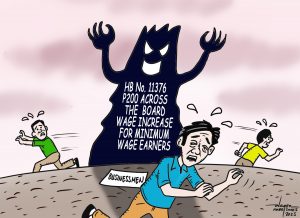IN RECENT months, alarming incidents involving pedestrians being hit while crossing the street have resurfaced in Davao City. These incidents, often occurring at designated pedestrian lanes, point to a growing disregard for road safety and the basic rights of those on foot. As the city continues to advocate for livable and sustainable communities, it is high time we put pedestrians first, starting with something as simple as respecting the white lines on our roads.
Pedestrian lanes are not just painted stripes; they are a promise of safety. They signal that those walking have the right of way, that their lives matter, and that the road is not a space dominated solely by motor vehicles. In fact, Baguio City’s “King of the Road” campaign, institutionalized through Ordinance No. 103, Series of 2009 (An Ordinance Establishing a Pedestrian Safety and Courtesy Program in the City of Baguio), reinforces this message by reminding all road users that pedestrians have the highest respect and priority.
Unfortunately, in Davao City, the promise of safety is increasingly broken. In too many instances, drivers either ignore or fail to slow down at pedestrian crossings, turning these supposed safety zones into danger zones.
The Citizen Walkability Study, released in 2024 by the Interfacing Development Interventions for Sustainability (IDIS), underscores this reality. Citizen scientists used the Pedestrian First Toolkit to assess pedestrian safety and comfort in Davao City, Tagum City, and Digos City.
In Davao City, the Citizen Walkability Study revealed that many pedestrian crossings are unsafe, hindered by barriers such as parked or moving vehicles, poor visibility, and the lack of active enforcement. The study identified nine pedestrian crossings with unclear or faded signage and markings, making it difficult for both drivers and pedestrians to navigate safely. Alarmingly, only 47% of respondents agreed with the statement, “Cars approach the intersection slowly enough for an elderly person or young child to feel safe crossing the street,” indicating that more than half of pedestrians do not feel safe at intersections. Supporting this concern, 68% of respondents confirmed that drivers often exceed speed limits, further highlighting the urgent need for traffic calming measures and stricter road discipline.
The same study emphasized that walkability is directly linked to sustainability. When walking is safe and accessible, more people are encouraged to choose active, low-emission transport. This, in turn, reduces traffic congestion, lowers air pollution, and contributes to healthier communities. But when pedestrian infrastructure is neglected, and drivers are not held accountable, we discourage walking and push people back into cars, creating a cycle of danger and pollution.
Davao City has long taken pride in its orderliness and discipline, but the situation on the roads tells us that more needs to be done. Strict enforcement of traffic laws must go hand in hand with a cultural shift among motorists. Respecting pedestrian lanes should not be seen as a chore but as a shared responsibility for community safety.
We urge every driver to slow down, yield, and stop when someone is crossing. Whether you’re in a rush or not, the few seconds you save by ignoring a pedestrian lane are not worth risking a life. Sustainable urban living starts with safe streets—and safe streets start with respect.
To the city government and traffic enforcement agencies: We strongly urge you to act decisively. Strengthen enforcement of traffic laws, particularly at pedestrian crossings. Install clearer signage, repaint worn-out lanes, improve street lighting and visibility, and consider traffic-calming infrastructure in high-foot-traffic areas. Most importantly, hold violators accountable through consistent penalties, not only after accidents occur, but as part of daily road discipline.
We also urge our city leaders and urban planners to prioritise walkability and pedestrian safety in all road designs and infrastructure projects. A truly sustainable Davao is one where children can walk to school, Persons with Diverse Abilities (PWDs) and seniors can cross the road with ease, and every citizen, regardless of their mode of transport, can move through the city without fear.
Pedestrians are not obstacles. They are people. They are your constituents, your neighbors, your loved ones. Their safety must be non-negotiable.
Let Davao City set an example. Not just a growing metropolis, but as a city that values life over speed, safety over convenience, and people over vehicles.
ENP. LEMUEL MANALO
Program Coordinator
JUSTIN JOSHUA PUNGYAN
Environment Research Officer



